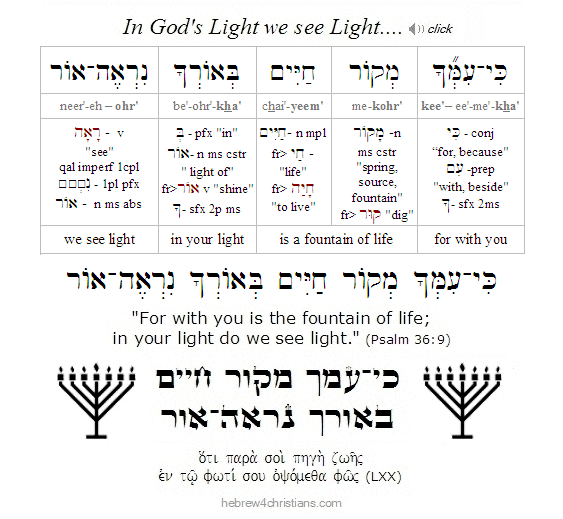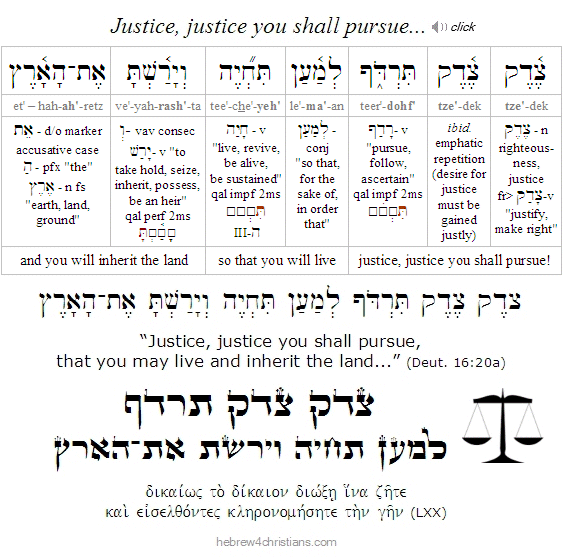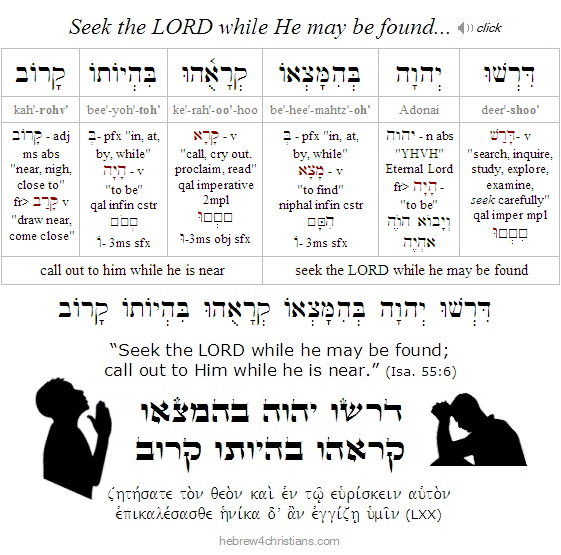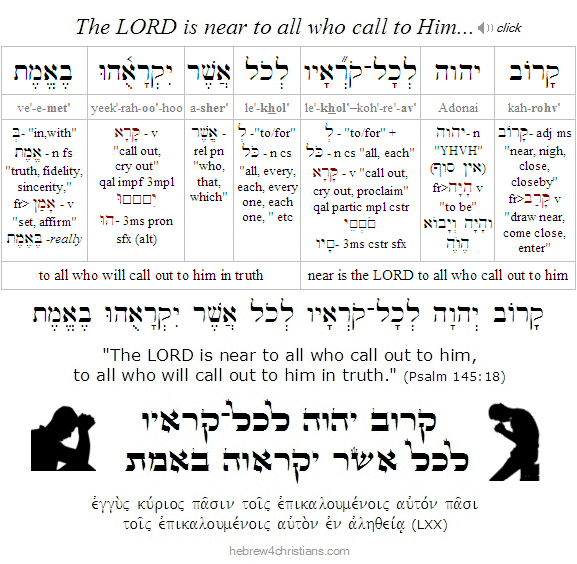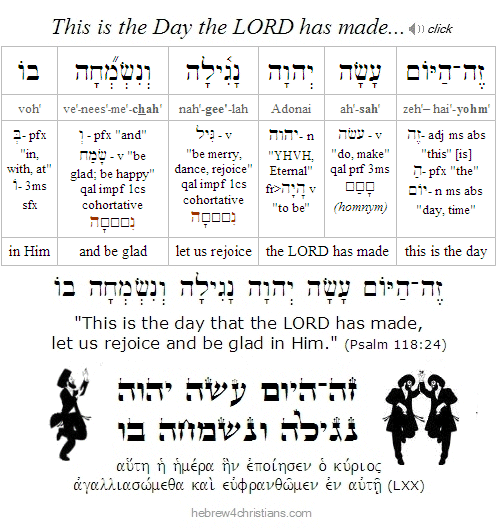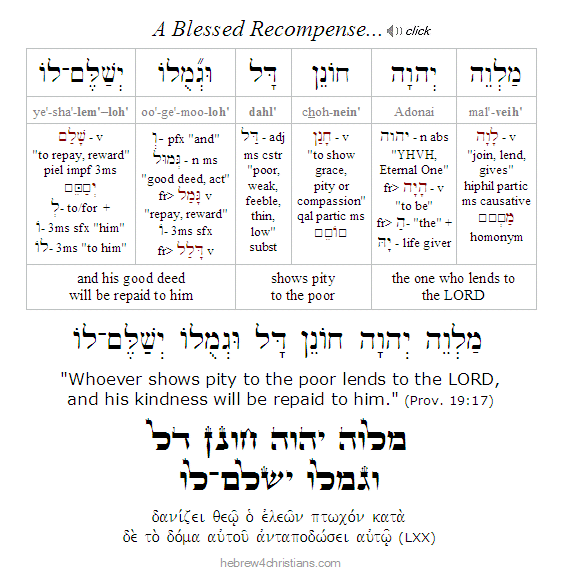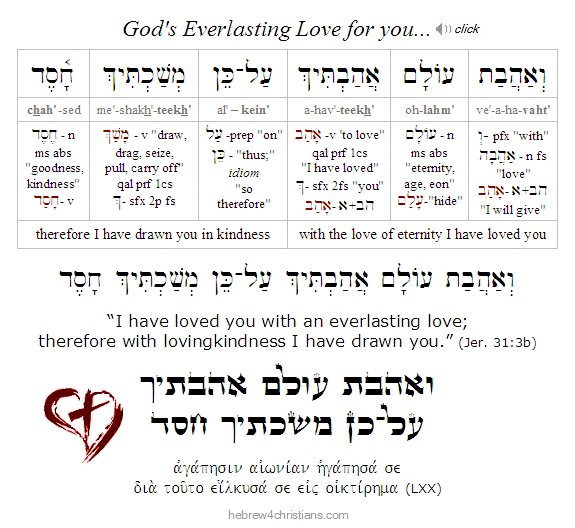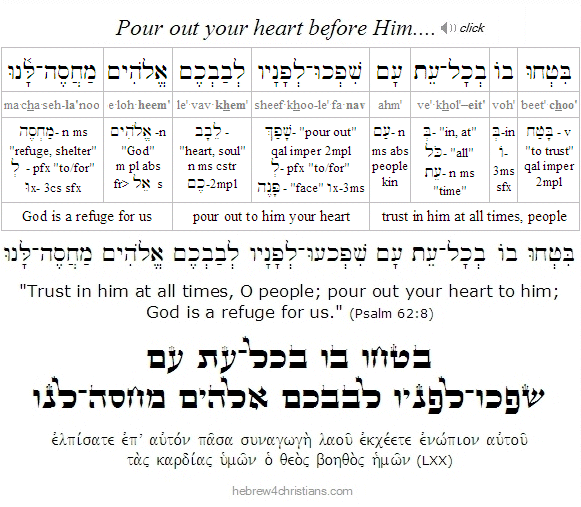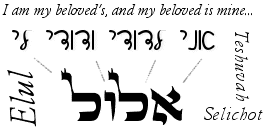|
August 2021 Updates (continued)
Note: If any page content appears to be missing, please refresh the page...
Knowing yourself in Him...
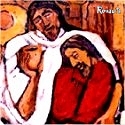
08.10.21 (Elul 2, 5781) It is vital to affirm your identity as a beloved child of God... You may not always feel the connection, but you must choose it regardless of your present emotional state, because your place in God's heart is a matter of truth, not sentimentality. Who you really are is grounded in the Reality and power of the LORD God of Israel.
God our Savior loved you before you were born (Jer. 1:5; 31:3); he loved you from eternity itself, and there never was a time when God did not love you (Jer. 1:5; 31:3). The LORD "wove you together" in your mother's womb (תְּסֻכֵּנִי בְּבֶטֶן אִמִּי) and brought you into being from nonexistence (Psalm 139:13-16). This is the precious gift of life itself (מַתַּת הַחַיִּים מִן הַשָּׁמַיִם). In Him you "live and move and have your being" (Acts 17:28). Moreover, the LORD gives you life from above and adopts you as his own (John 1:12; Rom. 8:15); he knows the number of the hairs on your head and every thought and word of your heart (Matt. 10:30; 12:26; Psalm 139:4); he directs every step of your journey throughout this life (Psalm 37:23; 139:3; 23; Prov. 16:9); he foresaw you when he offered up his life in redemption for your healing (1 Cor. 15:3; 2 Cor. 5:21; Gal. 1:4; 1 Pet. 2:24; 2 Cor. 5:18); you are briah chadashah, a new creation (2 Cor. 5:17; Gal. 6:15); you are always welcome in his presence (Eph. 1:6; Heb. 4:16); he will never leave you nor forsake you (Heb. 13:5); he prepares a place for you in the world to come (Jer. 29:11; John 14:1-3); and one day he will wipe away every tear from your eyes (Rev. 7:17; 21:4). In short, you belong to God from eternity: you were loved of God before you were born, and you will be loved by God after you die. From eternity unto eternity you are part of God's heart and plans...
When you are tempted to feel badly about yourself, then, take a moment to reaffirm who God says you are. Know yourself as accepted and beloved. Don't allow your past to hold you in exile; don't give place to shame; know yourself only in relation to God's eternal love for your soul. Whenever you feel hurt, angry, fearful, or rejected, turn inwardly to God and center yourself in his presence; realize that such negative feelings do not define what is most real about you. Bacharta ba'chayim: "Choose life!" Turn now to God; reaffirm that you are his beloved child, and thank him for the blessing of your redeemed life. Amen.
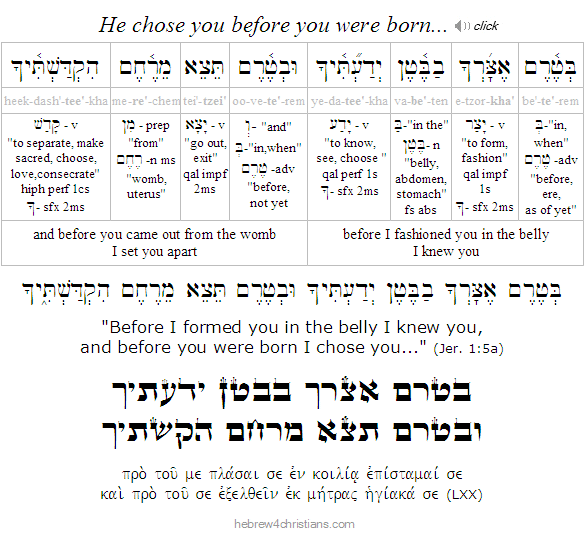 |
The High Holidays Psalm...
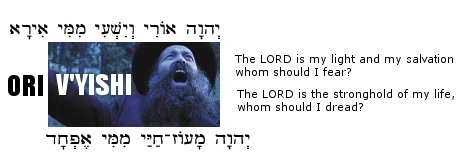
08.10.21 (Elul 2, 5781) It is an old custom to read (or to sing) the Book of Psalms during the month of Elul. In the famous Song of Moses, it is written: וַיּאמְרוּ לֵאמר אָשִׁירָה לַיהוָה / "and they spoke, saying: 'I will sing to the LORD' (Exod. 15:1). This phrase can be formed into an acronym for Elul (אלול), and the sages therefore reasoned that hearing the Psalms were vital during the Season of Repentance and Days of Favor.
Of all the great Psalms, however, Psalm 27 is considered the central one of the season of teshuvah (repentance). The midrash on the Psalms states that the word ori (אוֹרִי), "my light," refers to Rosh Hashanah (based on Psalm 37:6) whereas the word yishi (יִשְׁעִי), "my salvation" (lit. "my Jesus") refers to the atonement given on Yom Kippur. King David also mentions that God would hide him in his sukkah (בְּסֻכּה) in the time of trouble, referring to the holiday of Sukkot (Psalm 27:5). Therefore since it alludes to all three of the fall holidays, Psalm 27 is regarded as the thematic Psalm for the High Holidays of the Jewish year.
Hebrew Lesson:
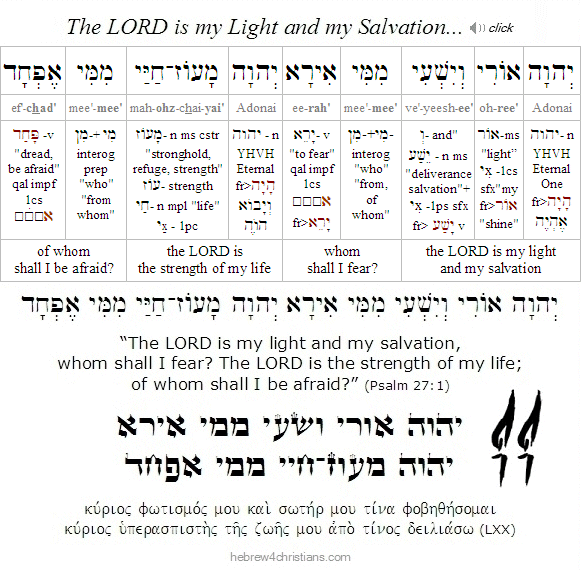 |
Finally, Psalm 27:13 contains a textual oddity. It is often translated: "Unless I had believed to see the goodness of the Lord in the land of the living." The word often translated "unless" is lulei (לוּלֵא), which read backwards spells Elul (אלול). This is said to suggest that salvation comes from faith that sees the goodness of the LORD. Repentance is only really possible if we believe in the goodness and love of the Lord "in the land of the living."
The Armor of His Light...
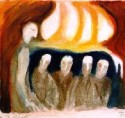
08.10.21 (Elul 2, 5781) The goal of the devil, the "prince of the power of the air," has always been to enslave people in dark places of fear, anger, bitterness, and pain. His primary weapon is deception, that is, various lies by which he captivates people and makes them tools for his evil purposes. We are able to resist the power of the lie by submitting to the truth about Reality (James 4:7). God's Name YHVH (יהוה) means "Presence" and "Love," and there is no power in heaven or earth that can overrule His hand. Therefore even if the prophesied "End of Days" were to begin this very hour, our responsibility is to focus on the Divine Presence and to walk in His truth and love. As King David said, "I have set the LORD always before me; because He is at my right hand, I shall not be shaken" (Psalm 16:8).
שׁויתי יהוה לנגדי תמיד
כי מימיני בל־אמוט
shee·vee'·tee · Adonai · le·neg·dee · tah·meed
kee · mee·mee·nee · bahl - e·mot

"I have set the LORD always before me;
because he is at my right hand, I shall not be shaken"
(Psalm 16:8)

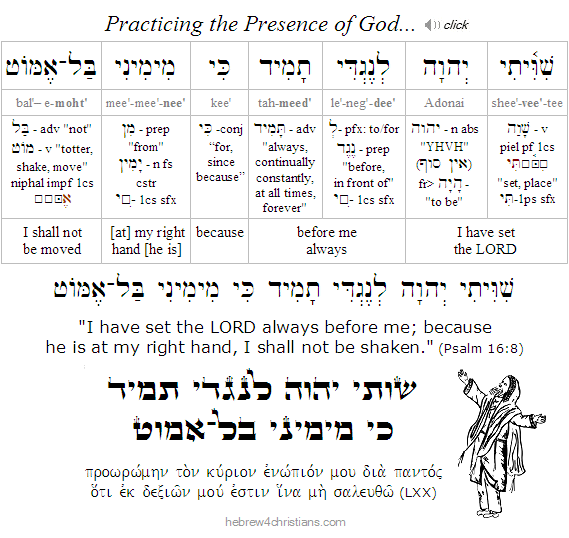 |
Encourage yourself by remembering that there is a future of healing and deliverance coming to us, though we must abide in the shadow of its substance for a bit longer: "For behold, the Day is coming (הַיּוֹם בָּא), burning like an oven, when all the arrogant and all evildoers will be stubble. The Day that is coming shall set them ablaze, says the LORD of hosts, so that it will leave them neither root nor branch. But for you who fear my Name, the Sun of Righteousness (שֶׁמֶשׁ צְדָקָה) shall rise with healing in its wings. You shall go out skipping like calves released from the stall. And you shall tread down the wicked, for they will be ashes under the soles of your feet, on the day when I act, says the LORD of hosts" (Mal. 4:1-3).
This awesome passage from the Book of Malachi primarily applies to the Second Coming of Yeshua and the great "Day of the LORD" (יוֹם יהוה). The "Sun of Righteousness," shemesh tzaddik (שֶׁמֶשׁ צְדָקָה), refers to Messiah son of David, the risen life-giving Healer of God. Of Him it is said, "The LORD God is a sun and a shield" (Psalm 84:11) and "the LORD shall be to thee an everlasting Light (אוֹר עוֹלָם), and thy God thy glory; thy sun shall no more go down, for the Lord shall be thine everlasting light" (Isa. 60:19-20). The Divine Light will shine on those who receive God's righteousness, that is, on those who put their trust in the One who said, 'I am the Light of the world' (John 8:12). Amen, the righteous will forever testify: "For with you is the fountain of life; in your light do we see light" (Psalm 36:9).
Despite the present hour, it is not all darkness... seek the Light and you will find it (Isa. 50:10).
Returning to the Lord...
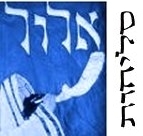
08.09.21 (Elul 1, 5781) The only way we can draw near to God is if we believe that He draws near to us, personally, intimately... "Behold I stand at the door and knock" (Rev. 3:20). Faith "hears the knock" as God's desire to draw near... faith hears his voice and opens the door to his presence; faith partakes in his communion.... "Draw near to God and he draws near to you" (James 4:8). The Hebrew word karov (קרוב) is translated using engidzo (ἐγγίζω) in New Testament Greek, a word that means to come close and touch... When we draw close to God, we reach out and find God holding us. Our "I" melts away as we cling to God as our dear life; we become one with his heart; we lose ourselves to find ourselves.
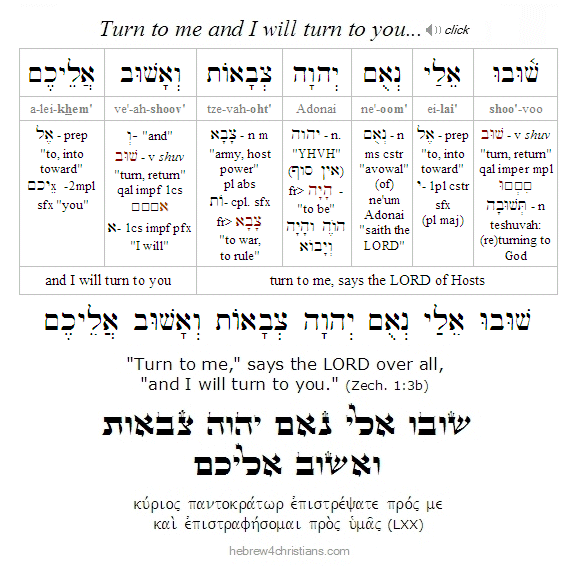 |
"Turn to me, and I will turn to you..." (Zech. 1:3). Someone might wonder why we must take the initiative, yet that is because God has never turned away from us; he has always been the one who loves us most of all and awaits our return to his love.... "Turn to me and you will discover that I have never left you nor forsaken you."
Yeshua illustrated the idea of teshuvah (i.e., תְּשׁוּבָה, "returning to God") by telling the famous story of the "prodigal son" (Luke 15:11-32). After selfishly squandering his father's inheritance, a wayward son decided to return home, full of shame and self-reproach. "But while he was still a long way off, his father saw him and was filled with compassion for him; he ran to his son, threw his arms around him and kissed him." The father then ordered a celebratory meal in honor of his lost son's homecoming. When his older brother objected, the father said, "We had to celebrate and be glad, because this brother of yours was dead and is alive again; he was lost and is found."
This parable reveals that teshuvah ultimately means returning (shuv) to the outstretched arms of your Heavenly Father... God sees you while you are still "a long way off" (Rom. 5:8). He runs to you with affection when you first begin to turn your heart toward Him. Indeed, God's compassion is so great that He willingly embraces the shame of your sins and then adorns you with "a fine robe, a ring, and sandals." Your Heavenly Father even slaughters the "fattened calf" (Yeshua) so that a meal that celebrates your life may be served....
 |
Parashat Shoftim - שופטים
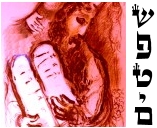
08.08.21 (Av 30, 5781) Chodesh tov, chaverim. Our Torah reading for this week (Shoftim) begins with the commandment that the people of Israel should appoint judges (i.e., shoftim: שׁפְטִים) and officers (i.e., shoterim: שׁוֹטְרִים) so that justice would be enforced throughout the promised land (Deut. 16:18). The call for justice is famously stated as, "tzedek, tzedek tirdof" (צֶדֶק צֶדֶק תִּרְדּף): "Justice, Justice you shall pursue" (Deut. 16:20). The word tzedek means "righteousness" and involves the duty to adhere to moral truth. Throughout the Torah portion the theme of social justice predominates, as the ethical characteristics for judges are defined, as well as for elders, kings, prophets, and priests, all of whom are responsible for maintaining a just and healthful society. As the prophet wrote: "The work of righteousness (tzedakah) shall be peace" (וְהָיָה מַעֲשֵׂה הַצְּדָקָה שָׁלוֹם), and added that "the service of righteousness (וַעֲבדַת הַצְּדָקָה) shall be quietness and security forever" (Isa. 32:17).
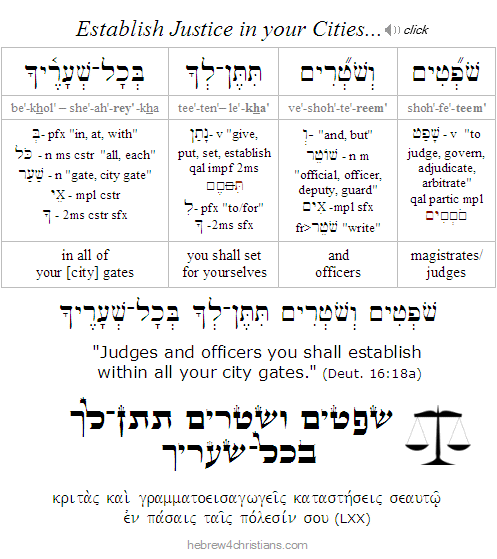 |
The call for justice, "tzedek, tzedek tirdof" (צֶדֶק צֶדֶק תִּרְדּף) is emphatically stated to teach that justice must be pursued in an entirely just manner, that is, the methods used to obtain justice must themselves be just... The Scriptures therefore do not advocate pragmatism or utilitarian thinking. There are no "noble lies" in the Kingdom of Heaven. Violence (verbal or physical) or deception done in the name of God is always forbidden and will be judged by the LORD. We must execute great restraint and caution when we seek to confront oppression in the world. If you want to change the world around you, begin with yourself....
Hebrew Lesson:
Drawing near in our need...

08.06.21 (Av 28, 5781) "Draw near to God, and he will draw near to you" (James 4:8). There are no conditions given here -- other than your honest need to connect with God for help. "Purify your hearts, you double-minded ones" (δίψυχοι, lit. "two-souled ones"); make up your mind and be unified within your heart: "How long will you go limping between two different opinions?" (1 Kings 18:21). You are invited to come; God has made the way; your place at the table has been set and prepared. "Let us draw near with a sincere heart in full assurance of faith (ἐν πληροφορίᾳ πίστεως), with our hearts sprinkled clean from an evil conscience and our bodies washed with pure water. Let us hold fast the confession of our hope without wavering, for he who promised is faithful" (Heb. 10-22-23).
Hebrew Lesson:
Deliver us from Offence...

08.06.21 (Av 28, 5781) Yeshua forewarned that just before the End of Days, "many shall be offended, and shall betray one another, and shall hate one another" (Matt. 24:10). What dreadful people, you might imagine... what terrible depravity will mark that time! And yet here we are today, with so many crusading for their own personal sense of victimhood, demanding special treatment, and threatening retaliation for being treated unfairly... It must be remembered, however, that whenever we decry offence in others, we may be reflecting the evil within ourselves (Matt. 7:1-5). What is this evil within you ask? How about being intolerant toward those who differ from us? How about be impatient – refusing to allow others to share their perspectives? Indeed, how many of us make the demand that others be "perfect" but turn a blind eye to our own imperfections? And what about the sin of unforgiveness? What about our attitude of suspicion -- using the "evil eye" regarding others' motives – looking for something impure – rather than extending to them the benefit of the doubt? Do you carry resentment with your heart? Do you hold on to a grudge over a real (or imagined) insult from the past? Do you harbor the desire to seek revenge? All of these evil attitudes reveal a hard heart - and failing to remember that all that is good in your life comes exclusively by the mercy of God alone... When you feel offended, look within and carefully consider the assumptions at work in your thinking. Ask whether your indignation is based on the truth of God or something else. Are you demanding: "My will be done, in heaven as it is on earth?" Are you seeking your own vision, or surrendering to the truth of Reality?
Someone might object by saying that it is not right to overlook the evil we see in others, for example, the unjust practices of deceptive and immoral politicians, or the actions of criminals who commit acts of lawlessness. When we see evil, how do we see the good instead? Should we ignore wickedness and close our eyes to what is happening?
Well of course we should uphold law and the prosecution of criminals, and we should admonish (and sometimes even rebuke) our brothers and sisters when they sin, but in an ultimate sense, we have to see past the evil, to let it pass, in trust that God is sovereign and orders all things according to his sovereign purposes -- and that implies understanding that God suffers evil to exist in order to demonstrate his judgment, as it says: "The LORD has made all things for its purpose -- even the wicked for the day of evil" (Prov. 16:4).
Hebrew Lesson:
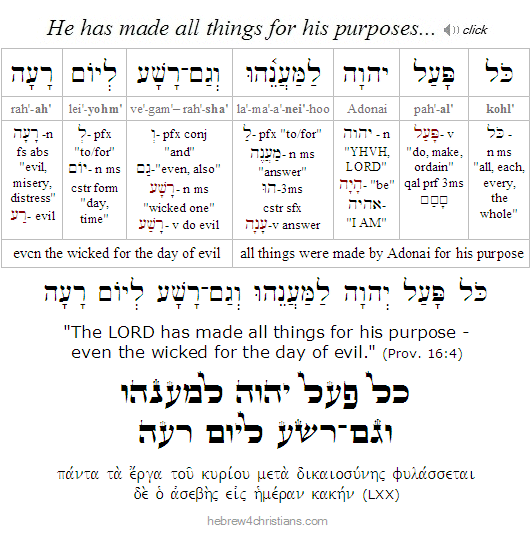 |
Forty Days of Teshuvah...
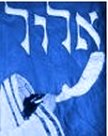
08.06.21 (Av 28, 5781) The last month of the Jewish calendar (counting from Tishri) is called Elul (אֱלוּל), which begins Saturday, August 7th at sundown this year. Traditionally, Rosh Chodesh Elul marks the beginning of a forty day "Season of Teshuvah" that culminates on Yom Kippur. The entire month of Elul is therefore a time set aside each year to prepare for the Yamim Nora'im, the "Days of Awe," by getting our spiritual house in order.
Click the timeline for more information:
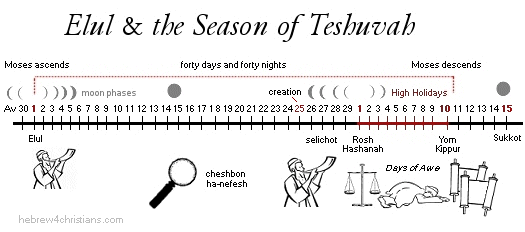 |
Days of Favor...
According to Jewish interpretation of Torah, the month of Elul represents the time that Moses spent on Sinai getting the second set of tablets after the idolatrous incident of the Golden Calf. Moses ascended on Rosh Chodesh Elul and descended 40 days later on the 10th of Tishri (the end of Yom Kippur). These 40 days are sometimes called Yemei Ratzon (יְמֵי רָצוֹן) - "Days of Favor," since it was during this time that God forgave the Jewish nation after the sin of the Golden Calf (Pirke d'Reb Eliezar). Therefore the sages have said Elul marks a favorable season to turn to the LORD for help restoring broken or strained relationships in our lives.
יְהִי רָצוֹן מִלְּפָנֵיךָ יהוה אֱלהֵינוּ
וֵאלהֵי אֲבוֹתֵינוּ שֶׁתְּחַדֵּשׁ עָלֵינוּ חדֶשׁ טוֹב
בַּאֲדנֵינוּ יֵשׁוּעַ הַמָּשִׁיחַ אָמֵן
ye·hee · ra·tzon · meel·fa·ney'·kha · Adonai · E·lo·hey'·noo
vei·lo·hei · a·vo·tey'·noo · she·te·kha·deish · a·ley'·noo · cho'·desh· tov
ba'a·do·ney'·noo · Ye·shoo'·a · ha·ma·shee'·ach · a·mein

"May it be Your will, LORD our God and God of our fathers,
that you renew for us a good month in our Lord Yeshua the Messiah. Amen."

Download Study Page
It is written: "The LORD is near to all who call to Him, to all who call out to Him in the truth" (Psalm 145:18). Since God desires all to turn to Him, those who pray with awareness of their need to surrender to the LORD will assuredly find His favor (see 1 John 5:14).
Note: For more information about the Forty Days of Teshuvah, see the Elul pages.
This is the Day...

08.06.21 (Av 28, 5781) God's Name is "I-AM-with-you-always," imanu-El (עִמָּנוּ אֵל) - always in the midst of you, your heart, your Center (Matt. 28:20; Isa. 41:10, Psalm 23:4, etc).... The LORD is so named because he is never without his own, and we are who we are in relation to his presence in our lives. Yeshua is not simply the Lord of the past or the Lord of the future, but the Lord of this moment, this "here" and this "now." He is the same yesterday, today, and forever - the breath of life, our sustaining hope, the Shepherd of our souls... Whatever else may come of this day, this is the day that the LORD has made, and we find peace in God's Presence... Let us look to Him in this hour!
Hebrew Lesson:
More Blessed to Give...

08.06.21 (Av 28, 5781) From our Torah portion for this week (i.e., Re'eh) we read: aser te'aser: "You shall tithe..." (Deut. 14:22). Understand this as the great blessing of becoming a conduit of heavenly good to others. The sages say that giving tzedakah (צְדָקָה, i.e., "charity") to others is like a nursing mother. As long as she suckles her child, her milk supply is replenished and even increases; but once she weans the child, her supply dries up... So also when we give of our substance – the more we give, the more we will have; the less we give, the less we will have (Matt. 13:12). Therefore as our Lord taught us: "Give, and it will be given to you. Good measure, pressed down, shaken together, running over, will be put into your lap. 'Middah keneged middah' (מִדָּה כְּנֶגֶד מִדָּה) - for with the measure you use it will be measured back to you" (Luke 6:38). It is more blessed to give than to receive (Acts 20:35).
Hebrew Lesson:
Repentance and Paradox...
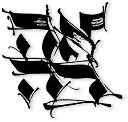
[ The following is related to the month of Elul and the "Season of Repentance"... ]
08.06.21 (Av 28, 5781) To be a human being is a paradox, caught between the realms of the infinite and nothingness; a union of endless possibility yet terminating limitation. Man desires to live forever but is conscious that one day he will die. He is an incongruity - a mix of flesh and spirit, saint and sinner, good and evil, angel and animal... In light of this, a spirituality that demands for us to be always happy, always "up," is dishonest, since the truth is grounded in what is real, and that includes both the miserable and the tragic as well as the joyful and sublime. It's not that there is no difference between good and evil within the heart, but both are part of who we really are. It is the bittersweet struggle, the process of walking as "saintly sinners," "holy fools," "dying immortals," and so on, that defines us. We must embrace our brokenness, in order to become whole; there is no healing without true confession of our need. Therefore we come to the paradoxical cross - the place of utter pain, separation, and death - to find healing, acceptance and life.
Please note this is not to deny that we are to walk by the Spirit and reckon ourselves dead to sin in the Messiah (Rom. 6:11); however, far from being a sign of a lack of spirituality, personal struggle is a sign of its presence.... Only those who are conscious of the tragic, who are haunted by the disparity between what "is" and what "ought" to be; only those who are divided within themselves, torn by inner tension and conflict - those aware that they are both in this world but not of it - sojourners, a long long way from home, homesick for the heavenly city, who inwardly ache and yearn to be fully redeemed - only these, it may be said, are consciously spiritual. After all, the worldling, the self-confident and self-possessed, rarely desire deliverance from themselves and are often content to rationalize the state of their soul; the spiritual person, on the other hand, senses a profound incompletion, a lack, a fracture that runs straight through the core of reality, a breach that needs to be healed...
I would utterly die of despair over myself were it not for the truth that it is not about who I am that is as important as about who He is...
There is great joy, of course, and we are indeed to "rejoice in the Lord always," but there is also real pain in our lives, and I'd rather be in the company of those mourning the mess they have made of their lives than with someone who thinks they've got it all together... "We are treated as impostors, and yet are true; as unknown, and yet well known; as dying, and behold, we live; as punished, and yet not killed; as sorrowful, yet always rejoicing; as poor, yet making many rich; as having nothing, yet possessing everything" (2 Cor. 6:8-10).
Hebrew Lesson:
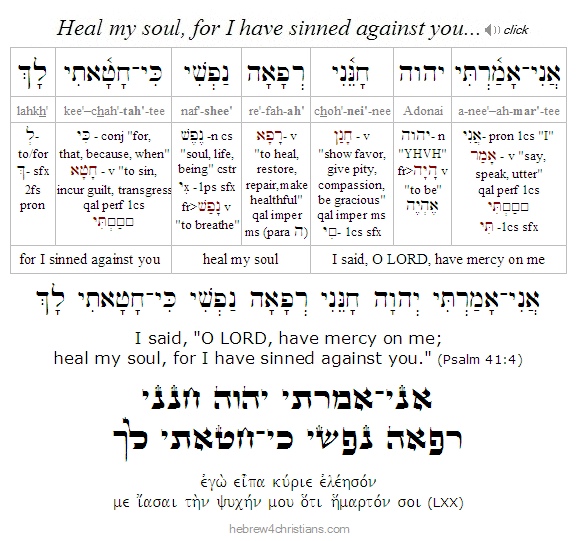 |
Personal Note: I want to express my heartfelt appreciation to each of you who stand with this ministry and encourage me to continue... You are in my prayers, and may it please the LORD our God to draw you ever closer to Him through the grace we share in Yeshua our glorious Savior. Amen, and chodesh tov!
Trusting God's Providence...
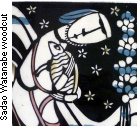
08.06.21 (Av 28, 5781) The Scriptures reveal that creation is "teleological," which means that it is "going someplace" and that there is order and purpose to our existence. Your life is not adrift in a random universe that is destined to ultimately fade away but is grounded in the Divine Mind and Will that personally supervises and pervades all things. A lack of emunah (faith) has been likened to a passenger flying on an airplane who doesn't believe there is a pilot in the cockpit... Faith in the LORD believes that a single supreme, all-knowing, all-powerful and benevolent spiritual Power directs all things, and that God is the beginning, middle, and end of all conscious meaning, truth, and substance, as it is written: כִּי הַכּל מִיָּדוֹ הַכּל בּוֹ וְהַכּל לוֹ הוּא, "For from him and through him and to him are all things" (Rom. 11:36). A life of faith in the one true God imparts the blessing of shalom (inner peace) and assures the heart that all shall be made well by the love of God (Jer. 29:11). Everything God does is for the very best, and there are no exceptions to this truth (Rom. 8:28).
Our faith that everything God does is for the best is not some rationalization that denies or minimizes the suffering we encounter in life, but is an affirmation that there is an unseen (though knowable) good at work that ultimately will heal us and comfort our shattered hearts... The phrase gam zu l'tovah (גַּם זוּ לְטוֹבָה) is an affirmation that "this too is for good," and that this "this" includes the various challenges and struggles we face during our days of sojourn here on this earth. Every "down" in life prepares us for an "up," with the ultimate end being beatitude and everlasting joy. Challenges draw us closer to God, igniting our hearts to cry out for his Presence and blessing. Even death itself is a passageway to eternal life (Psalm 16:10; 49:15; 1 Cor. 15:12-58). בַּעֲצָתְךָ תַנְחֵנִי וְאַחַר כָּבוֹד תִּקָּחֵנִי - "You guide me with your counsel, and afterward you will receive me to glory" (Psalm 73:24). By faith "we know that if the 'tent' that is our earthly home is destroyed, we have a building from God, a house not made with hands, eternal in the heavens" (2 Cor. 5:1). God is our good Shepherd who leads us along the byways of the desert of this world (Psalm 23:4). In God's presence is total and absolute joy; at his right hand there are pleasures forever (Psalm 16:11). As it is written in the sacred testimony of the prophets: "No eye has seen, nor ear heard, nor the heart of man imagined, what God has prepared for those who love him" (Isa. 64:4; 1 Cor. 2:9). The LORD "will wipe away every tear from our eyes, and death shall be no more, neither shall there be mourning, nor crying, nor pain anymore, for the former things have passed away" (Rev. 21:4, Isa. 25:8). God foresees your way and prepares a place for you (John 14:1-3); he has ready a precious white stone with your "hidden" name inscribed (Rev. 2:17); the table is being set and your place has been reserved...
So be encouraged, friend. You do not need to struggle alone – bitter and afraid that you might be swallowed up in your infirmities… God knows the groan of your struggle and invites you to find solace and strength in Him. "It is enough to open your heart the smallest amount - even the width of a pin - to repent, so that you feel a stab within your heart, like a piercing sting in living tissue, not like a needle thrust into dead flesh" (Menachem Mendel of Kotzk). Bittachon (בִּטָּחוֹן) is a Hebrew word that means trust in God... Those who have bittachon do not worry about the future because their faith fully permeates their heart and mind, enabling them to surrender their cares and burdens to the Lord.
Hebrew Lesson:
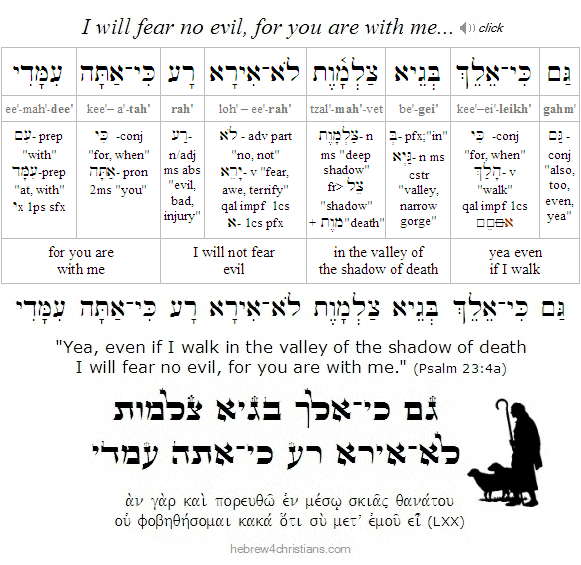 |
His Everlasting Arms...

08.05.21 (Av 27, 5781) God is both infinitely loving and infinitely just, and both of these "attributes" are inseparably a part of who he is. God is One. Nonetheless, the cross of Yeshua proves that "love is stronger than death, passion fiercer than the grave; its flashes are flashes of fire, a raging flame, the very flame of the Lord" (Song. 8:6). It is at the cross that "love and truth have met, righteousness and peace have kissed" (Psalm 85:10). This means we must drop our defenses – even those supposed objections and pretenses voiced by our shame – and "accept that we are accepted." It is God's great love for you that leads you to repent and to turn to him. Allow yourself to be embraced by his "everlasting arms."
Genuine repentance will entirely change you. It is an act of profound respect over what God has done on your behalf. You say, but I am a miserable wretch! Indeed that is so, but the consciousness of your wretched state is the heart's cry for love... God goes "outside the camp" to meet with you. He enters the leper colony to join you there, in your wretchedness, and even takes upon your fatal disease. He sees you in your desperate estate and joins you there. God enters into the dust of your death and says, "Live!"
Repentance means changing your thinking, turning around to face the truth, and returning to embrace God's love. It does not identify the whole person with sin, but rather regards all people as redeemable, worthy, and valuable to God. Conviction of sin is not the end, but rather the means to newness of life. God saved us so that we could be in a love relationship with Him. We must "choose life," and that means choosing to welcome God's love into your heart. The only sin that can keep you from God's everlasting love is the denial that his love is personally for you. You must forsake seeing yourself "in the flesh" and take hold of God's spirit, his passion, and his grace for your soul. You are worthy to be loved because God is worthy to make you so.
Repent and believe the good news. God is love, and that love is for you.
Hebrew Lesson:
Teshuvah and God's Love...
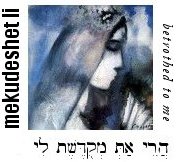
[ This weekend marks Chodesh Elul and the beginning of the 40 days of Teshuvah... ]
08.05.21 (Av 27, 5781) If you ever feel frustrated because of recurring personal struggles and failures, do not add to your troubles by despising yourself, but instead allow your character defects to lead you to humility and surrender before God. Bear in mind that you are unable to please God apart from his intervention and help (John 6:63), so avoid self-reproach, since teshuvah ("repentance") is not about learning to deal with your pains, after all, but trusting the Lord to do the miracle of healing within you. You "have been crucified with the Messiah" (Gal. 2:20) - the verb used in this phrase is a "perfect passive" form (i.e., συνεσταύρωμα), meaning that it indicates completed action done on your behalf. Your job is not to devise your own sanctification but to receive the blessing by faith, trusting in God's righteousness given on your behalf. The focus is not on you, and when you get out of the way and surrender, the grace and love of God will do the impossible within you (Matt. 19:26). In a way, teshuvah is a form of death, that is, identifying with the judgment of Messiah given on your behalf, just as teshuvah is life as you take hold of your new identity in him. Practically speaking you turn away (i.e., "die to") your anger, disappointments, bitterness, and sorrows by turning to the Lord for his acceptance and grace. God will bring freedom and newness of life from what binds your heart. As C.S. Lewis once advised: "Remember that He is the artist and you are only the picture. You can't see it. So quietly submit to being painted, that is, keep fulfilling all the obvious duties of your station... asking forgiveness for each failure and then leaving it alone. You are in the right way. Walk --- don't keep on looking at it" (Collected Letters). How you do teshuvah depends a great deal on where you are standing: if you are before the cross of Messiah, then you stand on the side of divine grace; otherwise you will remain in a place of exile, questioning God's love for you.
Hebrew Lesson:
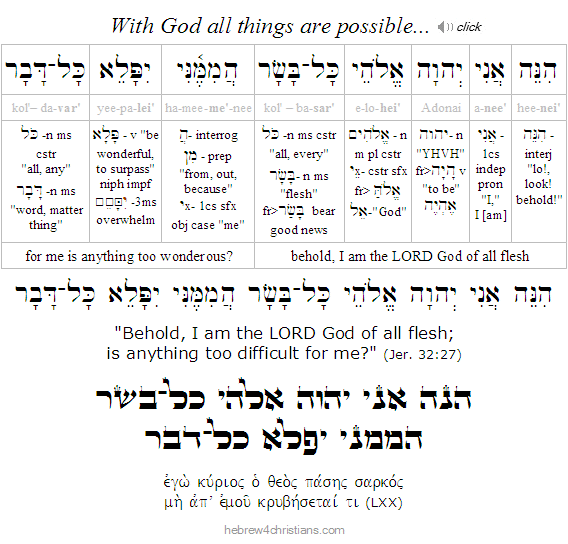 |
The message of the gospel (i.e., הבשורה, from the word basar) requires that you regard yourself as worth dying for, that you are God's friend... "There is no greater love than this: that someone lay down his life for his friends" (John 15:13). God quite literally demands that you regard yourself as benefited by the sacrifice of his beloved son Yeshua in your place; he demands that you understand how dear you are to his heart. God sees something of such great value in you that he was willing to suffer and die to redeem it from loss... Just as the kingdom of God is a "pearl of great price," so you are a pearl of great price to God. What grieves and angers God is the refusal to believe that you are someone of infinite importance to him... Only God can rightfully make such a demand because He knows that loving other things more than Him leads to "disordered love," darkness, and eventual madness. We were made for God's love, but substituting finite things for this infinite need will never suffice to bring lasting healing to our souls...
Those who are "in the flesh" cannot please God (Rom. 8:8). We must turn away from regarding ourselves as mere "flesh" and understand that we are essentially spiritual beings created and redeemed by God (2 Cor. 5:16). We must give up the distinctions in the "world of basar" - the carnal world that is known through sensuous apprehension - and accept ourselves as "new creations" in the Messiah. It is "not the children of the flesh who are the children of God, but the children of the promise are counted as offspring" (Rom. 9:6-8).
The mere conviction of sin is not the same thing as repentance. We have to step beyond a troubled conscience and have our sin crucified by God's love and grace. Grace is therefore essential to genuine repentance, since moral reformation is never enough. "When Christ calls a man, he bids him come and die." We must be humbled so that we can receive. God gives us bitter experience of our inadequacy to call us to return to him. Only God can kill the power of sin within our hearts. Conviction of sin is not the end, but rather newness of life.
There is a place for godly sorrow, of course, and for genuine regret over our sins. As we understand God's desire and love for us, we begin to realize that the essence of sin is the refusal of God's heart for us. The underlying issue with sin concerns the question of God's love. Simply abstaining from certain actions does not address the deepest need of the heart. It is not turning away from sin that matters as much as turning toward God. The death of sin is meant to lead us to the life of love...
 |
Seeking What is Above...

08.04.21 (Av 26, 5781) "If then you have been raised with Messiah, seek the things that are above, where the Messiah is seated at the right hand of God (לִימִין הָאֱלהִים); focus your thoughts on the things above - not on things here on earth - for you have died, and your life has been hidden with Messiah in God" (Col. 3:1-3). Note that the verb translated "you have died" (ἀπεθάνετε) indicates that your death is a spiritual reality you must accept by faith. You don't "try to die" to the flesh, since that is the fool's errand of man's "religion." No, you trust that God has killed the power of sin and death on your behalf and imparted to you a new kind of life power (John 1:12; Eph 2:5). Because you partake of an entirely greater dimension of reality, namely, the spiritual reality hidden from the vanity of this age, your life is likewise hidden from this world (Col. 3:4). Therefore we are instructed to consciously focus our thoughts (φρονέω) on the hidden reality of God rather than on the superficial and temporal world that is passing away: "For we are looking not to the things that are seen but to the things that are unseen. For the things that are seen are transient (i.e., "just for a season," καιρός), but the things that are unseen are eternal" (2 Cor. 4:18).
Just as you must trust and accept that Yeshua was crucified for you, identifying with you, taking your place in judgment, exchanging his life for your own, so you must trust and accept that you have been crucified with him, and that your old life was taken away and replaced with a new, indestructible nature. In other words, a union is created where his "for me" is answered by my "with him." Χριστῷ συνεσταύρωμαι– "I already have been crucified in Messiah" (Gal. 2:20). Indeed the two go together: to trust in the finished work of Messiah for you is to trust in his finished work within you... When he died on the cross for you, which sins didn't he bear on your behalf? which remedy did he leave unfulfilled?
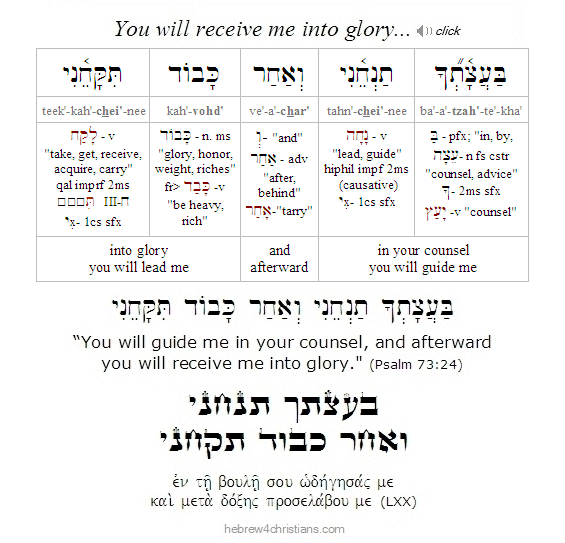 |
Deliverance from Ourselves...

08.04.21 (Av 26, 5781) We all struggle with sin in our lives, and each of us needs deliverance from various attachments and fears that keep us from the deeper life... The problem is within ourselves, that is, the contradiction of heart we experience in our double-mindedness, our ambivalence, and our unbelief (Jer. 17:9). We may recite the Shema every day and say that we love God with all our being, but in the ordinary moments of daily life we are drawn to other concerns, alien affections, other "gods." Indeed, whatever matters most to us, whatever consumes our attention, time, resources, and our interest, is something we "worship," that is, something we esteem as worthy and valuable...
People necessarily value things, and therefore every person alive is a "worshiper" (i.e., a person who finds "worth" in something). This applies equally to a devout atheist or pious skeptic as much as it does a deeply religious person... The question that matters, however, is what is your ultimate concern? What do you really want? Only when we begin to understand what draws and attracts us can we begin to discern what we really need. Therefore we must first acknowledge our false worship, our radical selfishness, and our sundry attachments in order to be set free. We must confess the truth that we are slaves.
Pride blinds us to the truth of our sickness of heart, persuading us to deny our problems, to cover them up, and to try harder and harder to "control" ourselves. This is a spiritual dead-end, a vicious circle, the "law of sin and death." We are set free, however, when we die to ourselves, that is, when we surrender to the love of God and receive the miracle of promised deliverance. Since we are powerless to change ourselves, to reform our lower nature, and to be healed by our own best efforts, we must abandon our "religion" and rely entirely upon the God for the power to heal. This is an ongoing venture: We die daily; we take up the cross daily, we walk with a limp from our inner struggle, and we cling to God alone show us the way and to guide our steps. Beloved, we have been crucified with Messiah and the old nature has lost its power over us; we are alive by the miracle of God's power. "If we live by the Spirit, let us also walk in the Spirit" (Gal. 5:25).
Hebrew Lesson:
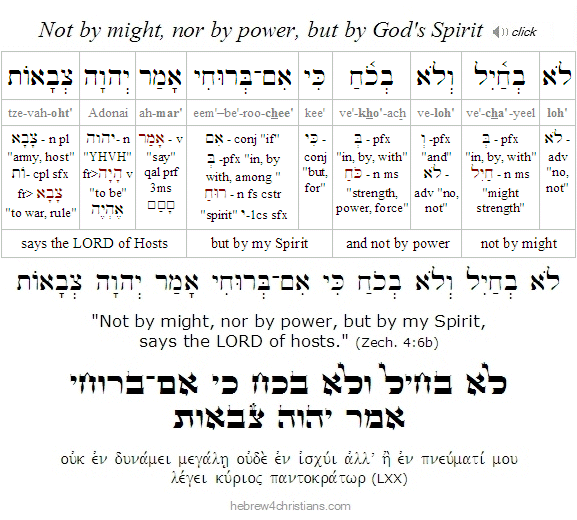 |
Seeing the Blessing...

[ The following is related to our Torah reading for this week, parashat Re'eh.... ]
08.04.21 (Av 26, 5781) "See, I am giving... the blessing (הַבְּרָכָה) when you hearken (i.e, shama: שָׁמַע) to the commandments of the LORD your God which I command you today" (Deut. 11:26-27). Do not understand this as referring to blessing that results from hearing God's word, but rather the blessing that enables you to hear it in the first place... That is the blessing of being made awake, alive, and attuned to the Spirit of God. In this world you may or may not receive material blessing as you heed the truth, though you assuredly will be sustained by God's ongoing care (Psalm 37:25). The heavenly blessing is always present before you, however, when you sincerely turn to God and seek to do his will. And may it please the LORD our God to help us turn to Him now, in this hour...
"Blessed be the God and Father of our our Lord Yeshua the Messiah, who has blessed us in Messiah with every spiritual blessing in the heavenly places" (Eph. 1:3). Note that the Greek text translated "with every spiritual blessing" (i.e., ἐν πάσῃ εὐλογίᾳ πνευματικῇ) does not refer to "merely spiritual" as opposed to substantial or material blessings, but rather the blessing given by the Holy Spirit, those powers and graces "in heavenly places" (ἐν τοῖς ἐπουρανίοις), that derive from the kingdom of God, which are the highest blessings of all.
Hebrew Lesson:
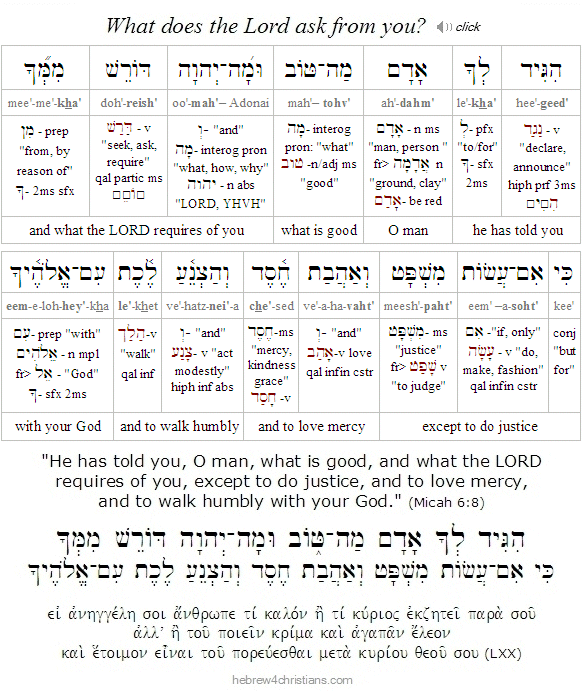 |
Am seulah...
Chosen and Treasured...

08.04.21 (Av 26, 5781) A passage from our Torah reading this week (i.e., Re'eh) warns us not to forget the truth about our destiny in heaven by engaging in excessive mourning practices: "You are children of the LORD your God. You shall not cut yourselves or make any baldness on your foreheads for the dead. For you are a people holy to the LORD your God, and the LORD has chosen you to be for him am segulah (עם סגלה) - a treasured people out of all the peoples who are on the face of the earth" (Deut. 14:1-2).
In this passage, Moses reminds the people that they are beloved children of the Eternal (יהוה) and therefore they were not to mourn like those without hope of life beyond the grave... Our God, the Father of Israel, is the Source of Life, and even if our earthly fathers die, we will never be orphans, because the LORD, the Everlasting God who is the "God of the spirits of all flesh" (אֱלהֵי הָרוּחת לְכָל־בָּשָׂר), always watches over us: "He will not let your foot be moved; he who keeps you will not slumber" (Psalm 121:3). But if we forget who we are, if we lose sight of our place in the Heavenly Father's heart, then we are likely to fall into a state of excessive and self-destructive mourning over the losses we inevitably experience in this world. In the most tragic cases, this can lead to the darkness of unremedied despair, "living among the tombs, crying out and cutting himself with stones" (Mark 5:5). On the other hand, if remember our place at the Father's table as his children, if we take hold that we are beloved of God - his very own "treasured people" - then we will regard the difficulties we encounter in this world as a test of faith intended for our good (Deut. 8:3,16, Jer. 29:11).
God regards us as his beloved children, and therefore we trust him as a child trusts his loving father. We may not always understand all that our father does, but we have complete faith in his good will toward us, even in the face of death itself. We do not engage in self-destructive mourning, then, because we accept that we are treasured by God and we trust in God's promise to us for eternal life (John 11:25). Because of this, Jewish halakhah (legal custom) puts limits to grieving practices. Excessive mourning, interminable gloom, self-destructive anger, or the refusal to let go of our fear may indicate a lack of faith in God's care as our Father. Remember where it says "God works all things together for good," for that includes even physical death... That is the message of the Kaddish. There is a future and a hope that transcends our life in this world. The Lord our Savior says: "Fear not, for I have redeemed you; I have called you by name, you are mine" (Isa. 43:1).
Hebrew Lesson:
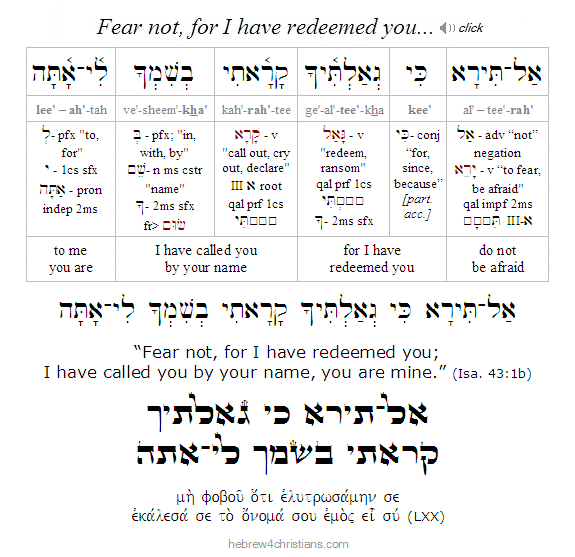 |
Note: For more on this very important topic, see the article "Am Segulah."
Daily Dvar Podcast:
Torah of the Good Eye...
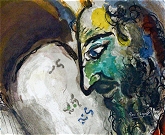
08.03.21 (Av 25, 5781) Shalom chaverim. The way we choose to see is ultimately a spiritual decision. In this "Daily Dvar broadcast, I discuss the "Torah of the Good Eye" and the spiritual need to seek goodness in everyday reality. I hope you will find it helpful.
Seeing Consequences...

08.03.21 (Av 25, 5781) Our Torah reading this week begins with the word re'eh (ראה), "you see," which is in the grammatical singular, but then goes on in the grammatical plural: "I am setting before you (plural) this day a blessing and a curse" (Deut. 11:26). This teaches us, first of all, that our individual choices have consequences for which we are responsible, and that those consequences will affect those around us, for either good or bad. This is the basic principle of bechirah chofshit (בחירה חופשית), or the freedom to make real choices...
The sages add that the phrase re'eh anochi (ראה אנכי), the first two words of the portion, can be read as "You see the 'I," referring to the ego that can be either a blessing or a curse. The blessing comes when the "I" hears the message of heaven and seeks to yield to God's will, whereas the curse comes when the "I " does not listen but goes its own way. The word blessing is therefore connected with focused listening, but the curse occurs when we no longer listen but "stray from the way." How you listen, then, determines the path you will take, either of righteousness and blessing or unrighteousness and trouble...
In connection with how our hearing affects those in our lives - either by bringing blessing to them or trouble - we read in Proverbs 22:6: "Train up your child in the way he will go, and when he is old he not depart from it." This applies first to the parents who must take the time to learn Torah and then to carefully teach their children (Deut. 6:7), yielding blessing, so that it may be well with them, and that they will do what is right in the eyes of heaven.
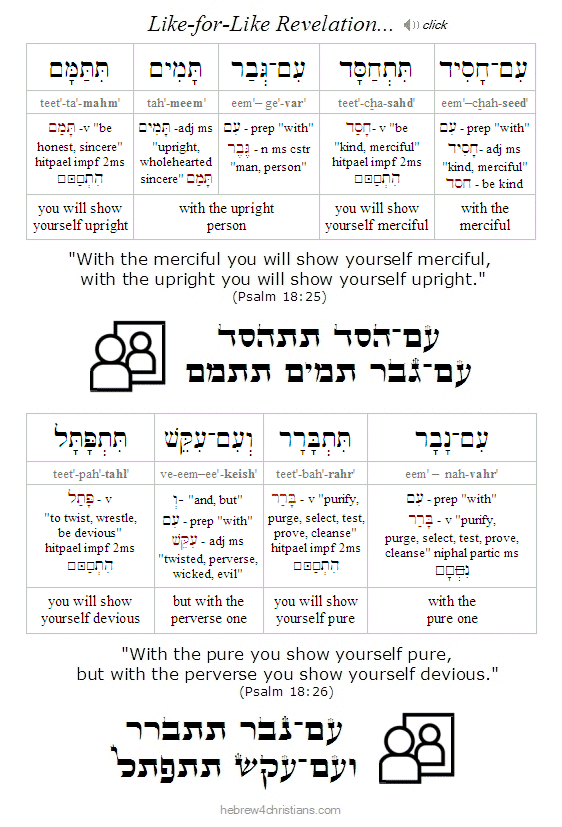 |
Seeking the Good... (שׁחֵר טוֹב)
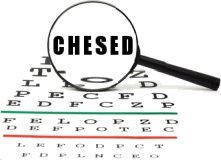
08.03.21 (Av 25, 5781) Our Torah portion this week, parashat Re'eh, teaches us to seek for the blessing rather than the curse. "Whoever earnestly seeks for good finds favor, but evil comes to him who looks for it" (Prov. 11:27). The one who seeks good is called shocher tov (שׁחֵר טוֹב), "a seeker of good." The shocher tov uses the "good eye" (i.e., ha'ayin ha'tovah: הַעַיִן־הַטּוֹבָה) to see worth and potential in others. The one who looks for evil, on the other hand, is called doresh ra'ah, "a searcher of evil." The doresh ra'ah has an evil eye (ayin ha'ra) that is stingy, critical and faultfinding. The proverb may therefore be stated this way: When you seek the good of others, you will find God's favor (ratzon), but when you search for evil in others, it becomes your own. As the Baal Shem Tov once said, "When we see faults in others, we must understand that they only reflect the evil within ourselves." Likewise King David said, וּתְפִלָּתִי עַל־חֵיקִי תָשׁוּב, "my prayer shall turn back upon my breast" (Psalm 35:13). Some prayers are conscious words spoken to God, whereas others are expressions of heart attitudes. Our proverb teaches that when we harbor indifference, ill will, or resentment toward others, we hurt ourselves; when we favor others and desire their blessing, on the other hand, we will find God's favor and blessing.
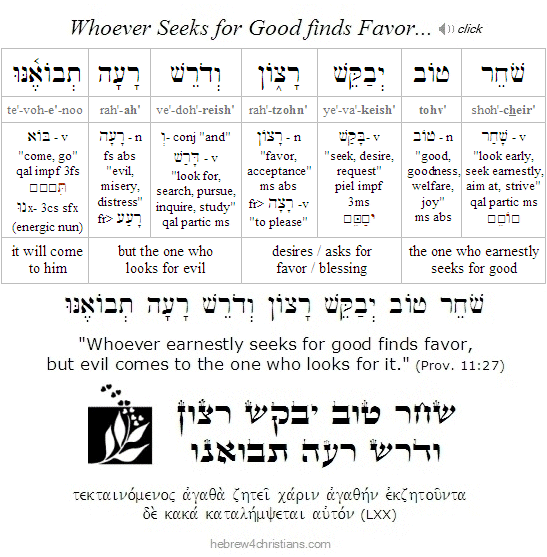 |
The heart looks through the eye.... A good eye (i.e., ayin tovah: עַיִן טוֹבָה) - sometimes called a "beautiful eye" (עין יפה) - refuses to think evil about others (it "does not impute the bad" - οὐ λογίζεται τὸ κακόν - as in 1 Cor. 13:5), but it rejoices in the truth – even if such truth is found only in the hope of a future good (1 Cor. 13:7). The good eye is the instrument of a giving heart that looks upon the needs and pains of others with genuine compassion. An "evil eye" (i.e., ayin hara: עַיִן רָעָה), on the other hand, is cynical, jaded, envious, and unsympathetic to other people and their struggles... Using a good eye takes from the treasure within the heart and gives it out freely to others: "The good person out of his good treasure brings forth good, and the evil person out of his evil treasure brings forth evil" (Matt. 12:35). There never is a risk that true compassion may be given away without warrant from heaven. In the future judgment to come, I'd rather be found guilty of "casting pearls before swine" than to be found guilty of withholding love from others...
A person with a "good eye" looks at things from the perspective of grace. It beholds all circumstances -- and especially other people -- and invariably finds something worthy and beautiful.... "Whoever sows sparingly will also reap sparingly, and whoever sows bountifully will also reap bountifully" (2 Cor. 9:6). As we give, so we are given... Therefore the "Torah of a Good Eye" (תּוֹרָה שֶׁל עַיִן טוֹבָה) teaches that "whatever is true, whatever is honorable, whatever is just, whatever is pure, whatever is lovely, whatever is commendable, if there is any excellence, if there is anything worthy of praise, think about these things" (Phil 4:8). טוֹב־עַיִן הוּא יְברָךְ - "The one with the good eye will be blessed" (Prov. 22:9; Matt. 6:22).
Hebrew Lesson:
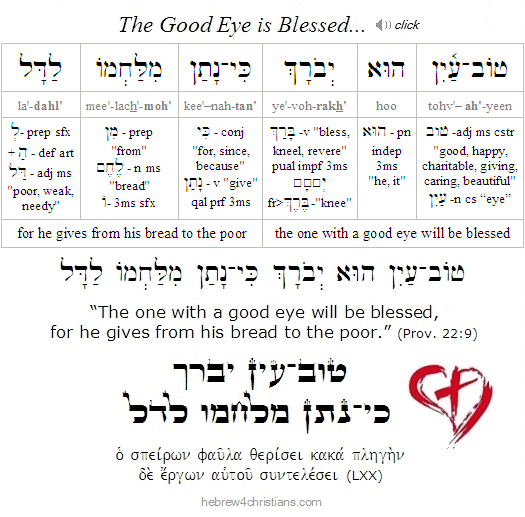 |
Struggle and Shalom...
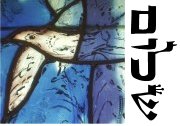
08.03.21 (Av 25, 5781) In our Torah reading for this week (i.e., parashat Re'eh) it is written: "You shall not worship the LORD your God in that way" (Deut. 12:4), which here refers to Canaanite practices of idolatry that were based on mystery and superstition. Unlike these religious cults that were based on vain speculations, however, the Jews were duty-bound to carry out God's will as expressed by the truth of divine revelation. Our father Abraham was given revelation of Torah (Gen. 26:5) and at Sinai moral truth was enshrined in the Ten Commandments (Exod. 24:12; Deut. 5:22). A basic assumption of Torah therefore is that "ought implies can," or that we are genuinely responsible to know and to do moral truth. Unlike the ancient "mystery religions" that abandoned themselves by "celebrating" the lower nature, the Torah insists on overruling our base impulses and finding peace in the midst of the struggle to walk in righteousness. Therefore we do not understand the Hebrew word "shalom" (שָׁלוֹם), or "peace," to simply mean the absence of strife, but rather "wholeness," "completeness," "healing" -- the integration of the heart and mind that comes through catharsis and personal struggle (Gen. 32:28). Faith does not mean passivity, but protest -- "arguing" for (and even sometimes arguing with) heaven, reminding God of his promises, lamenting over the divine absence; finding courage to oppose the status quo, and repeatedly appealing to heaven "be'khol levaveinu" (בְּכָל־לְבָבֵנוּ) -- with all our hearts -- precisely because we believe that our prayers can affect even the divine decrees... True faith confesses to "move mountains into the sea" (Mark 11:23) and refuses to let go of God until it receives the promised blessing to become "Israel" (Gen. 32:26).
Hebrew Lesson:
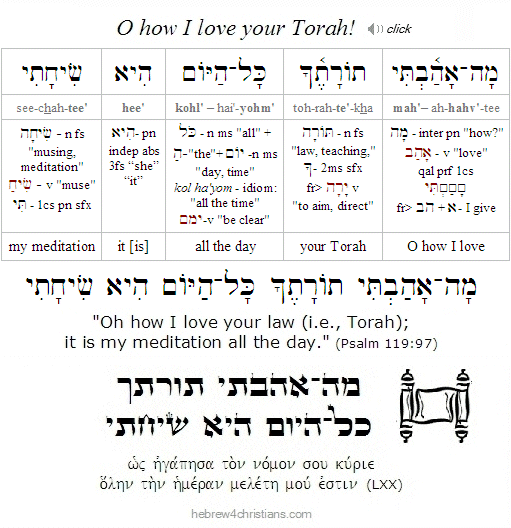 |
A Future and a Hope...
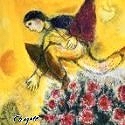
08.02.21 (Av 24, 5781) The message of the gospel is a good story, indeed, the "greatest story ever told" -- the story of our redemption, our healing, and ultimately our glorification in the presence of God -- and therefore we are to be of good cheer, for Yeshua has secured the victory of God's love for us over every objection and obstacle.... Indeed we should always be cheerful and of good spirit - even if we sometimes have to pretend - for such disposition agrees with what is ultimately real and true. Indulging in sadness, despondency, and despair are lies, emotional expressions of fear and unbelief.
It is essential to stay focused on what is true and to practice gratitude for the great blessing of life. In Hebrew, gratitude is "hakarat tovah" (הַכָּרַת טוֹבָה) or "recognition of the good." Gratitude is a kind of remembering the primal blessing that pervades all of reality, and in particular, for the innumerable acts of kindness and mercy that God gives to us every day of our lives. A grateful heart spontaneously feels joy: "Rejoice in the Lord always." It expresses appreciation for what is given: "O give thanks to the Lord, for he is good; his faithful love endures forever." "Bless the Lord, o my soul, and forget not his benefits..." "If anyone is in Messiah, he is a new creation; the old has passed away; behold, the new has come."
God will shake everything in our lives so that we know he is all we need. No matter what trouble we may face - no matter what demise of worldly hope - we can rejoice in the Lord because we know that there is a new world coming, a place especially prepared for us, a home that will be unspeakably beautiful and glorious. The Name of God (יהוה) means He is faithful and always keeps His promises. The day draws near when our redemption will be complete and we shall be forever healed (Rom. 8:23). In the "twinkling of an eye" our change will come. Meanwhile we persevere in hope. We keep our eyes on the heavenly city to come. We keep trusting that God is working all things for our ultimate good, even if we do not fathom how that is possible. It will be said on that day, "Behold, this is our God; we have waited for him, that he might save us. This is the Lord; we have waited for him; let us be glad and rejoice in his salvation" (Isa. 25:9).
We tend to become fearful once we forget the truth, and therefore we must constantly remind ourselves that God is the LORD who keeps his promises. When Peter walked on water, he began to look around him and lost sight of the Lord. Yeshua asked him, "Why did you doubt (literally, "think twice")? Thinking twice, turning back to the realm of the dead - to the thought of life apart from the Lord, causes us to sink into the miry waters...
Remember the future, friends! Remember the great promises of the Lord to take care of us, to welcome us into His presence with exceeding joy! "What no eye has seen, nor ear heard, nor the heart of man imagined, what God has prepared for those who love him" (1 Cor. 2:9; Isa. 64:4). "For behold I create a new heavens and a new earth, and the former things shall not come into mind" (Isa. 65:17; 2 Pet. 3:13). In God's presence "there is fullness of joy; at his right hand are pleasures forevermore" (Psalm 16:11). The Lord will swallow up death forever; he will wipe away tears from all faces...
Let me end this entry with a relevant from the apostle Paul, the great Torah sage and emissary of our Messiah and Savior Yeshua: "For it is all for your sake, so that as grace extends to more and more people it may increase thanksgiving, to the glory of God. So we do not lose heart. Though our outer self is wasting away, our inner self is being renewed day by day. For this light momentary affliction is preparing for us an eternal weight of glory beyond all comparison, as we look not to the things that are seen but to the things that are unseen. For the things that are seen are transient, but the things that are unseen are eternal. For we know that if the tent that is our earthly home is destroyed, we have a building from God, a house not made with hands, eternal in the heavens. For in this tent we groan, longing to put on our heavenly dwelling, if indeed by putting it on we may not be found naked. For while we are still in this tent, we groan, being burdened—not that we would be unclothed, but that we would be further clothed, so that what is mortal may be swallowed up by life. He who has prepared us for this very thing is God, who has given us the Spirit as a guarantee. So we are always of good courage. We know that while we are at home in the body we are away from the Lord, for we walk by faith, not by sight. Yes, we are of good courage, and we would rather be away from the body and at home with the Lord. So whether we are at home or away, we make it our aim to please him" (1 Cor. 4:15-5:9).
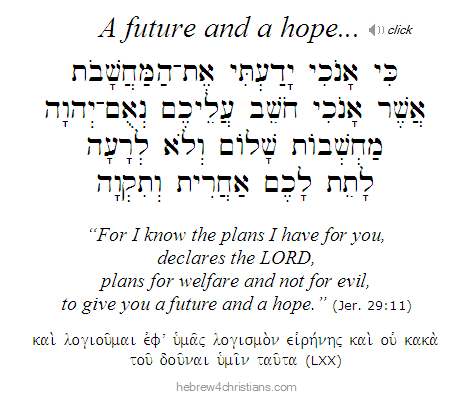 |
Pour out your heart...
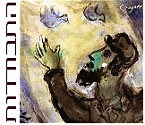
08.02.21 (Av 23, 5781) I've mentioned before that the Hebrew word "mitzvah" (מִצְוָה) is often translated as "commandment," though its basic idea is about our connection to God (i.e., the root צוה means to "bind" or "unite"). Being connected with the Almighty means making time to get alone to talk with him, relating to him as your Heavenly Father, and trusting that he genuinely esteems you as his beloved child. Whatever else you may think about the commandments of God, this idea of a love connection is foundational and essential. The very first of the Ten Commandments is Anochi Adonai Elohekha (אָנכִי יְהוָה אֱלהֶ֑יךָ), "I am the Lord your God," which invites you to open your heart to receive the touch of the Spirit of God. There is no love like that of the Lord, but you simply can't feel that love if you don't speak to Him, pouring out your heart and clinging to the truth of his love for you....
Pouring your heart out to God in an honest, spontaneous, and intensely personal way is called "hitbodedut" (הִתְבּוֹדְּדוּת) in Hebrew. After we "talk our hearts out" before the Lord, in our emptiness we can begin to truly listen, as it says, "In returning and rest you shall be saved; in quietness and in trust shall be your strength" (Isa. 30:15). Only after we sigh deeply and surrender are we receptive to the voice of the Spirit's whisper. אַשְׁרֵי כָּל־חוֹכֵי לוֹ - "Blessed are all those who wait for Him" (Isa. 30:18). We wait, we abide, we persevere -- even when God seems to "take his time" or does not immediately intervene in ways we might apprehend. We do not lose heart, for we find strength when we trust in God's love... The Light of the world still shines: Yeshua, be my inner word, my heart, and my groaning for life today, and forevermore, amen.
Since the essence of Torah is connection to God, the greatest blessing is to be filled with the desire to draw close to him, to experience "hunger and thirst" (i.e., visceral yearning) for God's presence and touch. Holy desire – expressed in the yearning of heartfelt prayer – is therefore a state of true blessedness, and the more desperate our need for God the more blessed we are. It is our holy need that creates a bond of connection between our soul and its Creator, and that is the deeper meaning of "mitzvah." As Yeshua said: "Blessed are those who hunger and thirst for righteousness, for they shall be satisfied" (Matt. 5:6).
Hebrew Lesson:
Tears in a Bottle...

08.02.21 (Av 23, 5781) We are to pray to God with all our heart (מכל הלב), but that must include the broken heart, too - that is, the broken parts of ourselves that must be recollected and mended before the passion of God's healing love. We "lift up our soul" to the LORD - all of ourselves - as we pour out our heart before God. Our feelings are important in prayer - the ingredient added to our petitions that quicken the heart and focus the will.... "Return, O Israel, to the LORD your God" (Hos. 14:2) means returning to the place of heartfelt faith - where the LORD is your God, and you are his beloved child.
Hebrew Lesson:
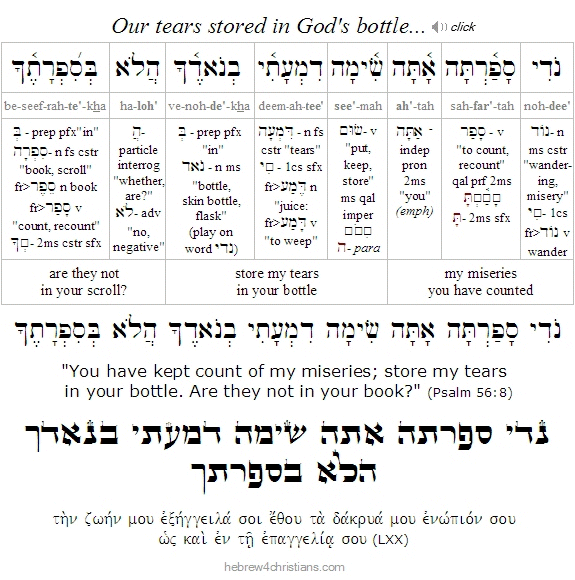 |
Stressing head over heart impoverishes us and divides us from ourseves. Our Lord prayed with such fervor that he sweat great drops of blood - and he did so despite his perfect orthodoxy. How can God ever wipe away our tears when we have refused to cry over this world? God will indeed wipe away all our tears, but the tears must be shed...
If you forget the essence of your soul you begin to lose sight of your reason for being, the "why" that underlies all other whys... This essence, however, is not discovered by means of reason, but by revelation -- it is a divine disclosure that awakens you to newness of life. Teshuvah is a return to the arms of your Heavenly Father...
Reverence and Freedom...
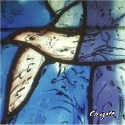
08.02.21 (Av 23, 5781) Reading the news of this deceptive world (עולם השקר) demonstrates the veraciity of Romans 1:28: "Since they did not see fit to acknowledge God, God gave them up to a debased mind to do what ought not to be done." This is the word that describes our godless and brazen generation: "Because they hated knowledge and did not choose the fear of the LORD (יראת יהוה), they refused my counsel and despised my reproof, therefore they shall eat the fruit of their way, and have their fill of their own devices" (Prov. 1:29-1:31). God is patient and loving, of course, though there comes a time when his patience runs out, when -- after repeated warning and appeals -- a culture tragically hardens its heart further and further until God withdraws his salubrious influence and people are left to their own vain imaginations and darkened impulses.
A widely accepted maxim of the Talmud is: "All is in the hands of God except the fear of heaven (yirat shamayim)" (Berachot 33b; Niddah 16b). In other words, though God constantly showers the world with grace and light, He does not "force" us to revere His Presence but rather leaves that choice with us. Of course God could overwhelm us all so that we had no choice but to see and fear Him, but He "withdraws" Himself and restrains His influence in our lives so that we can exercise faith. As Blaise Pascal said, "there is enough light for those who want to believe, and enough shadows to blind those who don't." The Hebrew word for seeing (ראה) and the word for fearing (ירא) share the same root. We cannot genuinely "choose life" apart from personally seeing it, but we cannot see it apart from the reverence of God. The reverence of God sanctifies our perception and enables us to see clearly. Therefore the righteous "walk by faith, not by sight" (2 Cor. 5:7).
Hebrew Lesson:
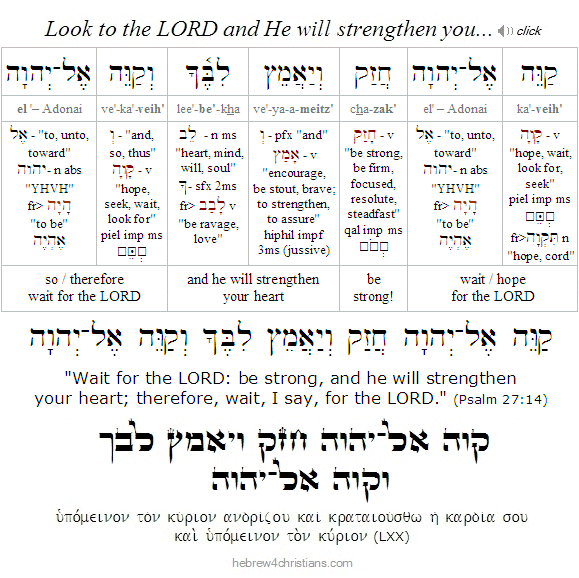 |
Forty Days of Teshuvah...

08.01.21 (Av 22, 5781) The last month of the Jewish calendar (counting from Tishri) is called Elul (אֱלוּל), which begins at sundown on Saturday, August 7th this year. Traditionally, Rosh Chodesh Elul marks the beginning of a forty day "Season of Teshuvah" that culminates on the holiday of Yom Kippur. The month of Elul is therefore a time set aside each year to prepare for the Yamim Nora'im, the "Days of Awe," by getting our spiritual house in order.
We are all on a spiritual journey, writing the "Book of our Life." To help us in the "writing" process, the Jewish sages encouraged us to set aside as a season each year for cheshbon hanefesh (חֶשְׁבּוֹן הַנֶּפֶשׁ) - "making an account of the soul." This means that we engage in honest self-examination about our behavior. After all, what is the essence of teshuvah if it is not honesty with yourself? "For everyone who does wicked things (lit., ὁ φαῦλα, that which is "easy," "worthless," or "vain") hates the light and does not come to the light, lest his works should be exposed" (John 3:20). Therefore we make some time to reflect about our lives from the previous year. We ask searching questions like, "How did I get to this place in my life?" "Where am I now?" "Am I where I should be?" We engage in this process of self-examination with an aim to grow -- to let go of the pain of the past and move forward. Confession (i.e., homologia: ὁμολογία) means bringing yourself naked before the Divine Light to agree with the truth about who you are. Indeed, the related verb word "homologeo" (ὁμολογέω) literally means "saying the same thing" - from ὁμός (same) and λόγος (word). We need to confess the truth if we are to be free from the pain of the past. When King David wrote, יְהוָה אוֹרִי וְיִשְׁעִי מִמִּי אִירָ֑א - "The LORD is my Light and my salvation; whom shall I fear? (Psalm 27:1), he implied that he should even be free of fear of himself and of his past....
יְהוָה אוֹרִי וְיִשְׁעִי מִמִּי אִירָא
יְהוָה מָעוֹז־חַיַּי מִמִּי אֶפְחָד
Adonai oh·ree ve·yeesh·ee · mee·mee ee·rah
Adonai mah·ohz-chai·yai · mee·mee ef·chad

"The LORD is my light and my salvation; whom shall I fear?
The LORD is the stronghold of my life; of whom shall I be afraid?"


Being honest with ourselves is essential for any sort of authentic spiritual life... "Not everything that is faced can be changed; but nothing can be changed until it is faced" (James Baldwin). "No person is saved except by grace; but there is one sin that makes grace impossible, and that is dishonesty; and there is one thing God must forever and unconditionally require, and that is honesty" (Kierkegaard). Amen. Confession means "saying the same thing" about ourselves that God says - and that means not only acknowledging our various sins, transgressions, and iniquities, but also affirming our beloved place in his heart. Saying that God doesn't love you is a lie as damning as denying His very existence...
The following (simplified) blessing can be recited to ask the LORD to help you prepare for the month of Elul and the forty day "Season of Repentance":
יְהִי רָצוֹן מִלְּפָנֵיךָ יהוה אֱלהֵינוּ
וֵאלהֵי אֲבוֹתֵינוּ שֶׁתְּחַדֵּשׁ עָלֵינוּ חדֶשׁ טוֹב
בַּאֲדנֵינוּ יֵשׁוּעַ הַמָּשִׁיחַ אָמֵן
ye·hee · ra·tzon · meel·fa·ney'·kha · Adonai · E·lo·hey'·noo
vei·lo·hey · a·vo·tey'·noo · she·te·kha·deish · a·ley'·noo · cho'·desh· tov
ba'a·do·ney'·noo · Ye·shoo'·a · ha·ma·shee'·ach · a·mein

"May it be Your will, LORD our God and God of our fathers,
that you renew for us a good month in our Lord Yeshua the Messiah. Amen."

Download Study Card
Note: Rosh Hashanah will begin in about five weeks (i.e., Monday, Sept. 6th at sundown). During the time leading up to the High Holidays, it is customary to engage in cheshbon ha-nefesh ("soul searching") and to derive comfort that God is forgiving and loving to those who sincerely turn to Him. The Jewish sages chose the seven "Haftarot of comfort" to encourage us to make our hearts ready for the upcoming High Holiday Season.
Education for Eternity...
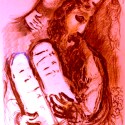
[ The following entry concerns this week's Torah reading, parashat Re'eh... ]
08.01.21 (Av 22, 5781) "Know within your heart that, as a man disciplines his son, so the LORD your God disciplines you" (Deut. 8:5). This verse expresses the idea of "musar" (מוסר), or moral education intended to develop godly character within us. "My son, despise not the chastening (i.e., musar) of the LORD; neither be weary of his correction (i.e., tokhechah). For whom the Lord loves he corrects; even as a father the son in whom he delights" (Prov. 3:11; see also Heb. 12:5-6). In light of Torah we infer that God disciplines us because we are his children, for the sake of our growth and maturity, and not for vindictive reasons. God's correction indicates that he feels responsible for our character development, as a good father feels responsible for the character development of his child. Correction from the Lord is ultimately "soul-building," since it enables us to be partakers of His holiness -- and is grounded in His love and concern for us as our Heavenly Father (see Heb. 12:5-11). Hang in there, friend. "For the moment all discipline seems painful rather than pleasant, but later it yields the peaceful fruit of righteousness to those who have been trained by it" (Heb. 12:11). May God help us in our "education for eternity."
וְיָדַעְתָּ עִם־לְבָבֶךָ
כִּי כַּאֲשֶׁר יְיַסֵּר אִישׁ אֶת־בְּנוֹ
יְהוָה אֱלהֶיךָ מְיַסְּרֶךָּ
ve·yah·da'·ta · eem - le·vah·ve'·kha
kee · ka·a·sher · ye·ya·seir · eesh · et-be·noh
Adonai · e·loh·hey'·kha · me·ya·se·re'·ka

"So know with your heart that, as a man disciplines his son,
the LORD your God is disciplining you." (Deut. 8:5)

Click to listen and learn the Hebrew text:
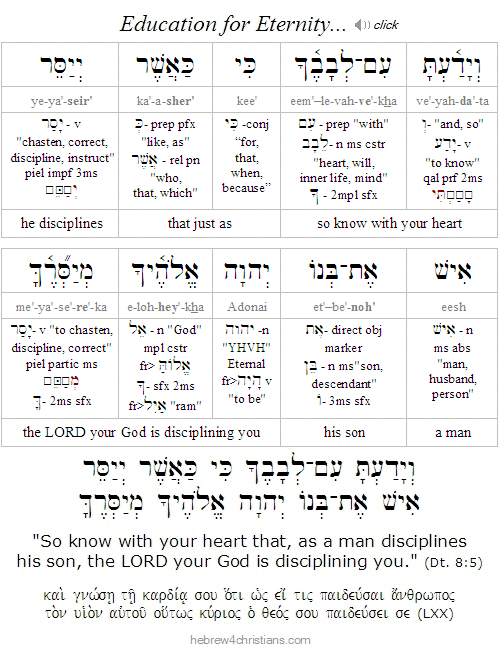
The Blessing or the Curse...
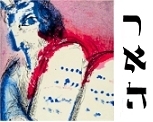
08.01.21 (Av 22, 5781) Our Torah portion this week (i.e., parashat Re'eh) begins, "See (רְאֵה), I give before you today a blessing and a curse: the blessing (הַבְּרָכָה), if you obey the commandments of the LORD your God, which I command you today, and the curse (הַקְּלָלָה), if you ... turn aside from the way that I am commanding you today, to go after other gods that you have not known" (Deut. 11:26-28). We obtain God's blessing (i.e., berakhah: בְּרָכָה) when we obey the LORD, and our decision to obey manifests the blessed state of walking before the Divine Presence (the direct object marker et (את) before the word "the blessing" alludes to the blessings of "Aleph to Tav," that is from Yeshua, as described in Lev. 26:3-13). As King David said, "I have set (שִׁוִּיתִי) the LORD always before me..." (Psalm 16:8). David made a choice to "set" the LORD before his eyes, for he understood that opening his eyes to Reality was the only path of real blessing.
On the other hand, we obtain God's curse (i.e., kelalah: קְלָלָה) when we close our eyes and "forget" that the LORD is always present.... Suppressing God's truth invariably leads to idolatry, that is, to self exaltation. Note that the root word for the word "curse" (kalal) means to be treated as of little account, and therefore "ratifies" the rebellious heart's attitude toward God. This is middah keneged middah - we are ignored by the LORD as we ignore Him, just as we seen by Him when we truly seek His face (Isa. 55:6-7). So we see that the blessing or the curse really comes from our own inward decision, and God establishes the path we have chosen. As King David said, "God supports my lot" (Psalm 16:5), and Solomon wrote, "The heart of man plans his way, but the LORD directs his steps" (Prov. 16:9).
Click to listen and learn the Hebrew text:
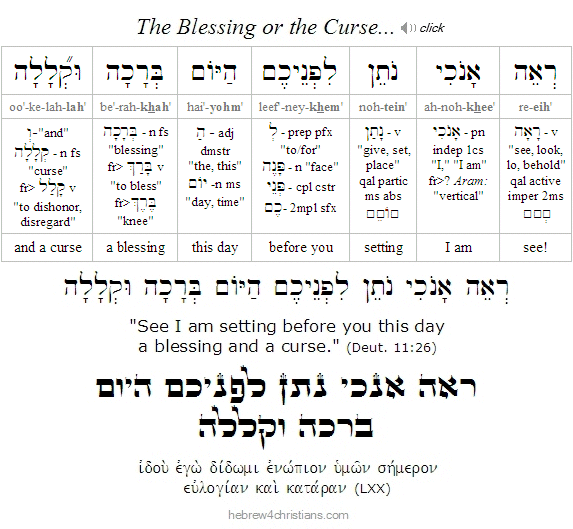 |
Note: "See, I am setting before you this day a blessing and a curse: the blessing, if you obey the commandments of the LORD your God, which I command you today, and the curse, if you do not" (Deut 11:26-28). Some of the sages say this admonition constitutes a severe reprimand of their immaturity. Forty years after receving the Torah at Sinai and the people still need to be cajoled like children with promises of rewards and threats of punishments? Those who are mature in their faith recognize good and evil for what they are: they seek the good because it is the way of truth and life. It is a sign of carnality to seek God because of the manna he provides rather than to seek him as the giver of life itself....
Haftarah: Aniyah So'arah (עֲנִיָּה סעֲרָה)
The weekly haftarah portion (i.e., reading from the Prophets) is usually thematically connected with the weekly Torah portion; however, beginning with the Fast of the Fourth month until the end of the Jewish year, the connection changes. First we always read three prophetic portions of rebuke leading up to the fast day of Tishah B'Av. Then, following Tishah B'Av, and for the next seven weeks leading up to Rosh Hashanah (i.e., the new year), we read selections of comfort that foretell of the future redemption of the Jewish people and the coming Messianic Era.
The third of the "Seven Weeks of Comfort" leading up to Rosh Hashanah is called Aniyah so'arah (i.e., עֲנִיָּה סעֲרָה, "O afflicted and storm-tossed one," Isa. 54:11-55:5), which reminds the Jewish people of God's eternal and unconditional covenant of peace. Indeed of the Jewish people it is said, "no weapon that is fashioned against you shall succeed, and you shall refute every tongue that rises against you in judgment." Therefore the LORD invites the people to drink from the waters of life: "Incline your ear, and come to me; hear, that your soul may live; and I will make with you an everlasting covenant (בְּרִית עוֹלָם), my steadfast, sure love for David (Isa. 55:3; Luke 1:68-75; Acts 13:34). Note. however, that when this Sabbath occurs on the New Moon of Elul, Isa. 66:1-24 is read instead.
 |
<< Return
|



































